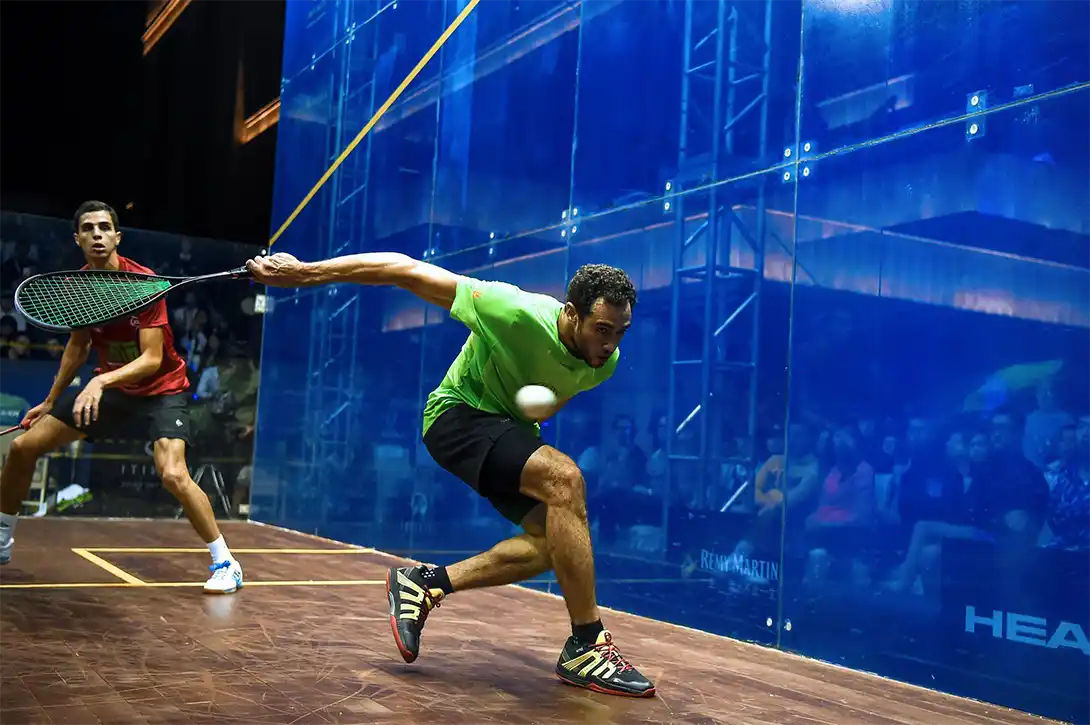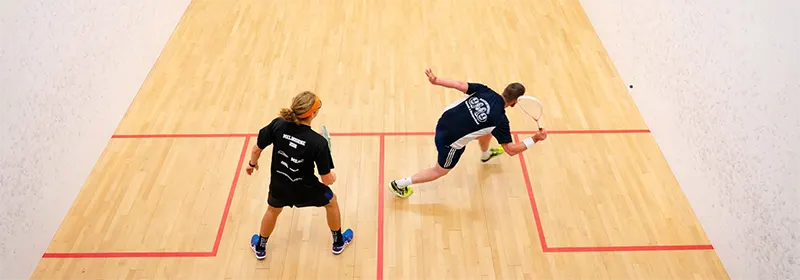25 June 2022 / 3-Min Read / Translate
Reaction Time can be decreased by training. There are plenty of drills, exercises and equipment you can buy to help you do that. There is something called a Reaction ball, and the video below shows how to make a cheap and easy homemade version. As I just mentioned, there are plenty of drills you can do, and you have probably seen videos of coaches throwing balls for players to catch or reach starting on the T. These are great because they require very specific squash movements that should include racket preparation or even swings.

It's easy to see where the ball has gone, but it would be much harder to guess before he hit it!
Anything longer than a second’s worth of work, which I know doesn’t sound very long, starts to work other system of the body, not just your reaction time. This type of training should be performed at the beginning of a session, as it requires fresh muscles to gain the most from it. Of course, in the real world situation of a competitive match, you will be required to react ALL through the match, the training is what actually matters.
I really like the reaction ball as it’s one of the easiest things to use on your own. Most other reaction training requires another person because you need that element of “unknown” involved. However, there’s more to reaction training than simply moving as quickly as possible to a stimulus. You also need to be able to control the racket and ball, so I like my pupils to stand near the front wall and hit forehands and backhands to themselves, either standing closer and closer to the wall or hitting the ball harder and harder. The reaction training comes from having to move the racket as quickly as possible to unexpected positions. Do a hundred shots then do something else. Do it three times each time you go on court and that should help.

What shot do you think he is going to play?
Back in May 2022, I wrote an article called Do Not Watch The Ball All The Time and its main premise is that if you focus the ball when you opponent hits the ball, you are ignoring vital information that can help you anticipate where they are going to hit it. Anticipation is defined as “The act of expecting or foreseeing something“. Another way to say that is to “guess”. Perhaps “an educated guess” is an even better way. Some players seem really good at “guessing” where their opponent is going to hit the ball and coaches are generally really good at that too because they spend most of their time looking at other players.
A great example of this is when somebody players a reverse angle or sometimes called “a leisure centre boast”. Simply by watching the player prepare for that shot and the position and timing of the contact point, it’s incredibly easy to see it way before it is played and when a coach causally starts walking to where the ball will be in a few moments time, the striker is often shocked at how easy it was to “read”. Not realising that their perceived “sneaky plan” was literally broadcast for all to see. The same can be said of boasts at the front. Recreational and many club players let the ball go behind their usual contact point and therefore signal to their opponent that they are playing a boast.
So let’s summarise: Your opponent often signals their intention through their body position, and by watching the general position of their racket and contact point, you can tell what they are going to play.
One last point about club and recreational players. In an attempt to “watch the ball at all times”, they look up to the front wall where they are going to hit it. The head therefore signals where the ball is going. That’s why moving the head it the opposite direction can sometimes confuse lower level players. It’s also one of the reasons you should keep you head still at the moment of impact.
Is this anticipation or simply cause and effect? Well, at lower levels it is cause and effect. The better you get, the more you can disguise and deceive your opponent by making contact with the ball in the same place, but changing the racket head angle or by hitting the ball later than normal, but still having the ability to hit the ball anywhere. Hitting later forces your opponent to make a decision and sometimes mistimes their split-step.
Anticipation is more than simply looking at your opponents, body and contact point and deciding what they are going to hit. it’s also about taking into account what they have hit from that position before, and this is where things get more interesting. Imagine you boast and your opponent moves froward in the same way they have previously to your boasts. All other times, they have played a very wide crosscourt. It’s game ball to them. Do they hit the wide crosscourt because you are expecting it? Or do they play a straight drop? What would you do?
Much like the coin toss, where each time you toss, there is a simple 50/50 chance of heads or tails, irrespective of the previous tosses. Is a player less or more likely to hit a crosscourt because all the others were crosscourts? I suppose that depends on WHY they were crosscourts. Was it because they were trying to get you to believe you that they can only hit crosscourts from boasts or because they really can’t do anything else?
Watch this 3-minute video about Andre Agassi “reading” Boris Becker’s serve. It will demonstrate the point about carefully watching your opponent.
Great anticipation is often simply a matter of carefully watching your opponent and learning from their positioning and timing. Try it, you might be surprised at how much better you can see what they are going to play!